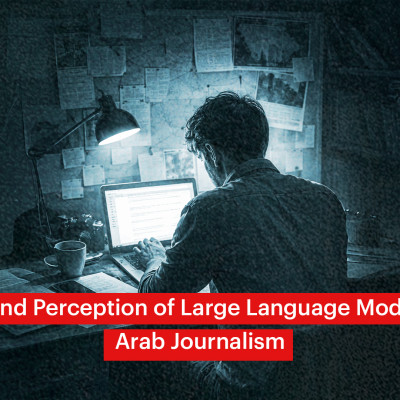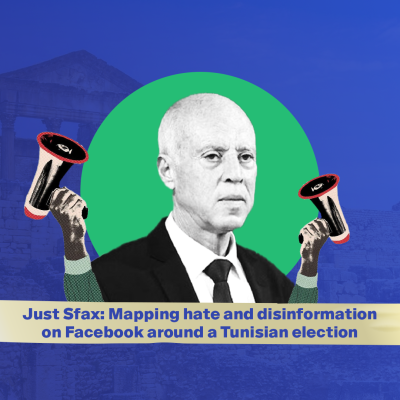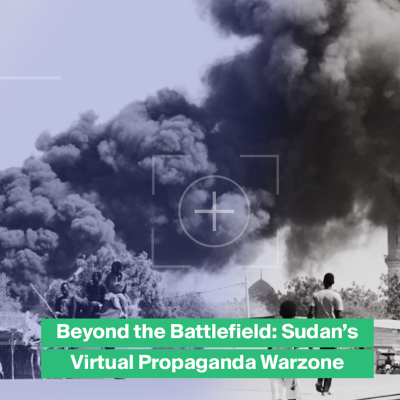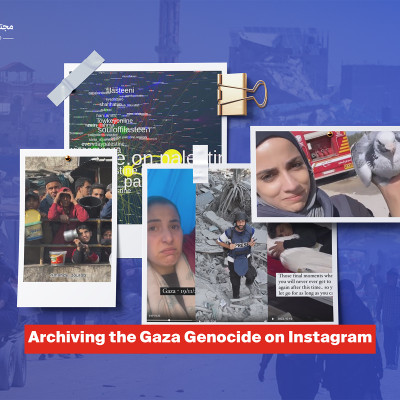Dr. Mansour Al-Maswariis a Yemeni academic at Amran University, a non-resident fellow at MESA Global Academy in Washington, DC, and an English news writer for AlBawaba. His research interests include Yemeni and GCC politics, culture, society, and anthropology, with a focus on democracy, peacebuilding, human rights, transitional justice, and the study of radical and armed factions in Yemen. You can reach him at [email protected].
Examining Houthi Manipulation and Populist Propaganda in the Wake of the October 7
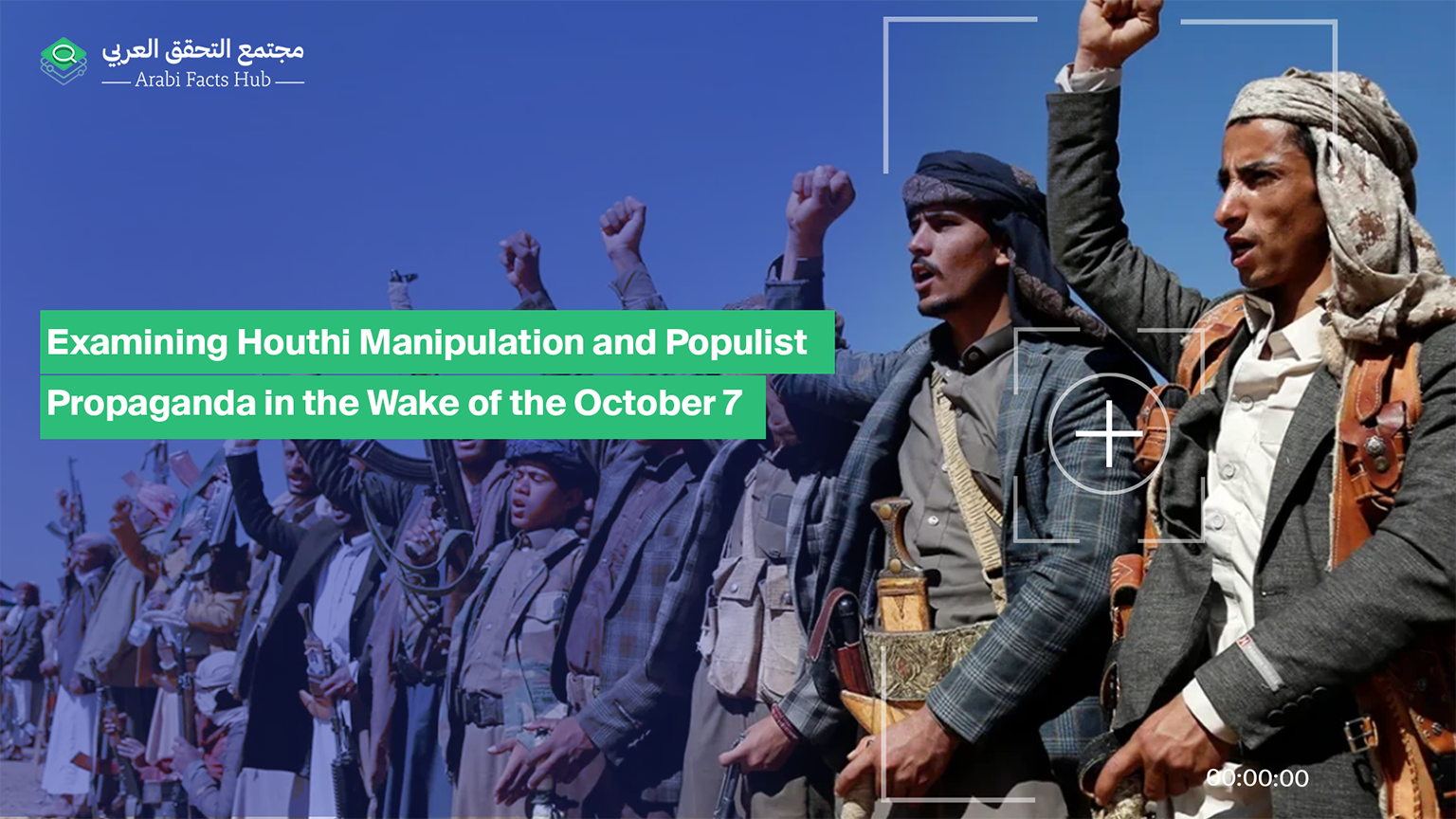
Throughout their journey to power from caves in the Sa’dah mountains to the international stage, the Houthis, who refer to themselves officially as Ansarullah, employ a sophisticated blend of populism and propaganda that deeply integrates ideological messaging across multiple social and cultural platforms to mobilize support and consolidate power. Since the Al-Aqsa Flood operation launched by Gaza-based Hamas fighters on Israel on October 7, 2023, the global community has sharply focused its eyes on the Houthis, who have doubled down on their manipulation of the Palestinian cause and their stance against what they label as U.S.-led Western arrogance. By adopting anti-colonial, anti-Zionist, and anti-Western narratives, Houthis have gained unprecedented cross-border popularity ever since.
October 7, 2023 marked a turning moment for the Houthis, allowing them to magnify their slogans and extend their populist appeal beyond Yemen. Houthis have sought to validate their ideological slogans, including their widely spread slogan "God is the greatest, Death to America, Death to Israel, Curse upon the Jews, and Victory to Islam.” These chants encapsulate their mission to confront the United States and Israel in solidarity with Palestine, Gaza, Al-Aqsa Mosque, and the oppressed. The ensuing war after October 7 significantly evolved Houthi populism and elevated their cause from a regional narrative to an assertive, globally-oriented stance, and transformed the Houthis from a group once perceived as rogue and theologically antiquated into a prominent anti-imperial force. By aligning themselves against American and Israeli influence, the Houthis have garnered substantial inward and outward support, capitalizing on the enduring grievances of the Yemeni people, who have suffered immensely since the Houthis’ takeover of power in September 2014 – shifting their perceived image from local gunmen to a power leading confrontation with the U.S. itself, as repetitively seen in their so-called “Battle of the Promised Conquest and the Sacred Jihad” or “Grand Battle” campaign in the maritime passages.
Almost a year after U.S.-led airstrikes against the Houthis, the U.S. failed to deter them despite deploying B-52 bombers on October 7, 2024, to target what they claim are Houthis underground missile storage sites. The U.S. intervention has been perceived as military aggression on Yemen in support of the Israeli occupation, rather than a deterrent against the Houthis. That intensified Yemeni resentment toward foreign intervention, portraying the Houthis as defenders of national sovereignty rather than mere power-seekers as they have often been regarded. In an interview with Reuters, Gerald M. Feierstein, a former U.S. ambassador to Yemen and current director of the Middle East Institute's Arabian Peninsula Affairs Program, commented on the U.S. military operations in Yemen since January 2024, asserting that “the United States has given the Houthis what they exactly wanted: ‘a fight.’ They've been confident that they [Houthis] could withstand whatever we were going to do. They have seen they win popular support." This stance contrasts sharply with U.S. officials' perceptions, including that of Gerald Feierstein himself, who, during his 2012 tenure in Yemen, interpreted the anti-U.S. chants and slogans of the Houthis as a strategic tool, noting that “for one reason or another, they [Houthis] believe that the slogan helps them in obtaining support.”
The role of October 7 in furthering Houthi propaganda
Houthis have sought to present themselves as key players on the regional anti-imperialist stage, launching military initiatives in the Red Sea in purported support of Gaza. These actions aim to cast the group as challengers to Western powers, diverting attention from the ongoing humanitarian crisis in Yemen under their governance. Since taking power in 2014, Houthis have imposed extreme hardship on the Yemeni population, withholding salaries for essential sectors such as health, education, and public services for over eight years. Under their control, Yemenis face unprecedented poverty, systemic deprivation, and social inequities, exacerbated by the Houthis’ consolidation of power, resources, and authority, to the detriment of Yemenis’ interests and fundamental rights.
As a movement rooted in radicalism, Houthis are well-positioned to leverage moments of conflict to advance their strategic aims. Their propaganda apparatus — comprising media, war chants, popular songs, and ceremonial displays — elevates their leaders as symbols of courage and resistance against American and Israeli aggression, whom they often label as the “great devils.” This narrative is reinforced by ongoing regional tensions, primarily Israeli actions in Gaza, Lebanon, and Syria, and the U.S.'s unconditional support for Israel. The rise of social media platforms amplifying unfiltered perspectives from ordinary people has fostered a global anti-imperialist sentiment, allowing the Houthis to align themselves within an anti-imperialist framework that resonates with local and international audiences. This shift not only enhances the Houthis' domestic image but also elevates their position on the global stage as a group fighting for the oppressed and opposing U.S. and Israeli dominance.
The way the Houthis, a Shiite-aligned movement, have strategically positioned themselves as defenders of Gaza, a predominantly Sunni cause, bridges traditional sectarian divides and enhances their legitimacy across sectarian lines. Houthi leaders like Mohammed Al-Bukhaiti, Hezam Al-Asad, Hussein Al-Ezzy, and Nasraddin Amer regularly criticize Sunni-led governments, particularly those in the region such as Saudi Arabia (KSA), the UAE, Bahrain, Egypt, and Jordan for betraying the Palestinian resistance by aligning with Israel and the United States through media platforms, social media accounts, and TV interviews. This narrative underscores the Houthis’ criticism that these governments act counter to the will of their people, allegedly prioritizing political interests over solidarity with Palestine.
In Houthi rhetoric, the sectarian conflict between Sunni and Shiite factions is framed as a construct promoted by Western powers, facilitated through regional allies such as the Wahabbi Saudi regime. According to Houthis, Sunni-majority populations are portrayed as powerless against the perceived cooperation between Israel and some regional regimes. This narrative gains traction amid reports of alleged logistical support routes from the UAE through KSA, Egypt, and Jordan, aimed at supplying Israel despite the Houthis’ blockades in the Red and Arabian Seas. Houthis, by contrasting their active resistance as a Shiite sect with the perceived inaction or complicity of Sunni-led governments, present themselves as true defenders of the Ummah (the Islamic nation) and claim moral leadership in the fight against what they name “the enemies of Islam.” Such a strategy finds resonance with segments of the public who view these assertions as credible, especially as the Houthis capitalize on the continued suffering in Gaza and Israel’s military actions. By positioning themselves as champions of Islamic unity and resistance and overcoming sectarian labeling, they seek to elevate their image beyond Yemen’s borders, in contrast to Gulf leaders who, they argue, either support or fail to challenge Israel’s actions. While influential, this manipulation overshadows the motivations behind the Houthis' ambitions, as they leverage this anti-imperialist stance to solidify their ideological influence within the broader Muslim world.
At a popular level, Professor Stacey Philbrick Yadav believes that “protests in Yemen against the current Israeli campaign in Gaza have reached an unprecedented size. But Palestine—and Gaza, in particular—has long mobilized mass support across Yemen’s political divisions.” Notably, Houthis employ a sectarian-based form of populist propaganda, evident in the recorded speeches of their leader, which are broadcast over different media outlets, loudspeakers in mosques, religious centers, institutions, public places, and roving vehicles. These speeches aired through Houthi-sponsored media, are treated as the authoritative source for the movement's decisions and aim to cultivate loyalty among Yemenis, especially those not yet fully integrated into the group’s ideological sphere. The speeches portray the Houthi leader as the "Guiding Leader" and rightful ruler, justified by his prophetic lineage, a notion that reinforces the group's doctrine of divine right. This approach frames opposition to Abdul Malik al-Houthi's authority as defiance of divine will, advancing a governance model founded on heritage rather than political merit.
In an interview with Al-Mahria TV on November 25, 2024, Hezam Al-Asad, a member of the Ansarullah Houthi Political Council, warned against U.S. preparations to launch ground military operations in Yemen with support from Saudi Arabia, the UAE, and forces loyal to the exiled Yemeni government. He emphasized that any move serving Israeli aggression — whether by the U.S., its regional puppets, or their local proxies — would be met with strong resistance from the Yemeni people. Al-Asad highlighted Yemen's heightened state of readiness, encompassing military preparedness, popular mobilization, and public awareness, to counter any external interference. This narrative highlights the alleged ambitions of Saudi Arabia and the UAE in Yemeni territories outside their control, where these countries’ influence and internal conflicts are increasingly evident. The anti-Houthi factions, backed by Saudi and UAE funding, are portrayed as serving foreign agendas, presenting a model many perceive as less favorable than the Houthi approach. The Presidential Leadership Council, which nominally unites these factions, is depicted as primarily a coordination body for Saudi and UAE interests, its cohesion dependent on external financial and regional support. Compounded by American, British, and Israeli military operations in Yemen, this perception fuels resentment and bolsters the Houthis’ image as protectors of Yemen's sovereignty and its people.
Al-Asad’s remarks echoed earlier statements by Houthi leaders, including Mohammed Al-Bukhaiti on October 23, 2024, and Mohammed Ali Al-Houthi, head of the Revolutionary Committee, who similarly accused regional powers of serving U.S., UK, and Israeli interests. They warned that any escalation involving local fronts would come at a heavy cost to Saudi Arabia and the UAE. These sentiments align with a significant speech by Abdul-Malik Al-Houthi on July 7 and July 21, 2024, in which he condemned Saudi Arabia and the UAE for their alleged alignment with U.S. and Israeli agendas. Al-Houthi warned of severe repercussions, stating that their actions had brought risks to their oil reserves, economic potential, and national security, and declared that the Yemeni people would not stand by as their nation faced destruction, asserting that if forced into confrontation, they would respond decisively, as they are already enduring war and blockade.
The Houthis' weekly mobilizations, which they have been organizing every Friday since October 7, 2023, amplify this sectarian appeal, drawing crowds across Yemen to purportedly legitimate the group's decisions under the pretense of a public "mandate" for Houthi leadership. These gatherings often incorporate populist slogans and patriotic songs that mix fervor for resistance with calls to defend Palestine. Nationalist chants and phrases like “Make it a world war” and “We entrust you, our leader” are frequently accompanied by images of Houthi leaders aligned with figures from the broader "Resistance Axis" in Lebanon, Iraq, and Iran, as well as symbols of Yemen and Palestine. This layered propaganda effort seeks to resonate with the public, even amidst the poverty and hardship the group's policies have engendered.
Additionally, during a gathering on November 1, 2024, Houthis reiterated their defiant slogans, such as “Oh, agents of Zionists, if you escalate, you will cry; we are ready, we are ready,” and “Ready, you cursed American... ready, you cursed Zionist.” These chants were disseminated through a video posted on the Houthi-owned Al-Masirah network account on X (formerly Twitter), underscoring the ongoing anti-Zionist sentiments expressed by the Yemeni populace. The Houthis have consistently articulated these messages, particularly as the embassies of Israel and the United States remain protected in various Arab capitals. Houthi leader Abdul Malik Al-Houthi delivered a televised address from behind a screen, threatening to escalate tensions with what he referred to as “Zionist traitors.” Additionally, a post in English on the Al-Masirah X account emphasized the “massive and awe-inspiring human flood in al-Sabeen Square,” which he claimed demonstrated the high levels of popular, tribal, and official readiness to confront any perceived Zionist aggression, thereby reinforcing Yemeni support for Gaza and Lebanon.
The slogan “With Gaza and Lebanon... We Are on Standby Against Any US-Zionist Escalation” reflects a populist propaganda campaign that has become a recurring event across all Yemeni governorates and major cities under Houthi control. The Yemeni people, whether in Houthi-controlled areas or regions governed by factions under the Saudi and UAE-backed Presidential Leadership Council, express solidarity with Gaza. However, the Houthis have utilized this support to rally public sentiment and legitimize their rule, seeking international recognition for their September 2014 coup. They leverage these gatherings to promote their agendas through mass displays of unity and loyalty.
But the weekly gatherings in support of Gaza also reveal underlying suffering and conflict. In one such incident, which took place in Sana’a on November 15, 2024, Abdul-Ghani Al-Razehi, a former Houthi leader, tragically resorted to self-immolation to protest the group's oppressive practices and the absence of justice. This act occurred as a Houthi orator fervently spoke about defending oppressed Palestinians, starkly highlighting the contradiction between their rhetoric and actions. Al-Razehi's desperate protest underscores the latest widespread despair among Yemenis subjected to Houthi injustices – and the hypocrisy of championing justice abroad while perpetuating suffering at home.
Moreover, to socialize their ideology as the accepted Yemeni identity, Houthis seek international recognition while asserting their divine right to rule Yemen. They argue that no other party has the legitimacy to govern unless they align with the narrow clan from which the Houthis originate. Mobilizations also include efforts to collect donations purportedly for the Yemeni Army, Missile Forces, Unmanned Drones Unit, Popular Committees, and Revolutionary Committees, framing these initiatives as support for the Palestinian cause. The “Million Man March” titled "With Gaza and Lebanon...” and other related activities give a micro-image of how Houthis encapsulate such phenomena, reflecting both their manipulation of societal sentiments and their long-term strategic objectives in accumulating broader geopolitical presence.
Following October 7, the Israeli-owned ship Galaxy Leader, seized by Houthis off Yemen coasts on November 19, 2023, was used for large-scale propaganda. Houthi fighters were airlifted onto it, enhancing the visual impact of the seizure and sending both political and military signals that reinforced their presence in regional consciousness, positioning themselves as the de-facto rulers of Yemen seeking international legitimacy. On September 15, 2024, coinciding with the eve of Prophet Mohammed's birth (12 Rabi' al-Awwal in the Islamic calendar), the Houthis organized a large-scale event on the "Galaxy Leader." This gathering was used to assert their ideological dominance. Notably, they did not celebrate Yemen's National Day, celebrated just 11 days later on September 26, nor their own September 21 anniversary, marking their takeover of Yemen in 2014. Indeed, the event's focus on the Prophet Mohammed's birth was an attempt to reinforce their claim to leadership by emphasizing their supposed lineage to the Prophet. Just two days after this display, the Houthis reportedly detained hundreds of Yemenis who were planning to celebrate National Day. This contradiction highlights their selective tolerance of public gatherings, as documented by the UN, and other human rights organizations, exposing the inconsistency between their rhetoric and actions.
Houthis have further capitalized on their seizure of the Galaxy Leader by transforming it into a paid attraction. Visitors are charged fees to board the ship, providing them with a new revenue stream. The combination of financial profit through a propaganda campaign reinforces the Houthi political message and leverages the captured vessel as a symbol of defiance. It bolsters their political image, enhances their control over the narrative, and accumulates funds to support their objectives in Yemen. Prominent Houthi members and affiliates have used the seizure of the Galaxy Leader to amplify support for their objectives while portraying their Saudi and UAE-backed opponents — supporters of Yemen's internationally recognized government-in-exile — as weak and ineffective. Through these actions, Houthis argue that without Saudi-UAE backing, the exiled government, or what they call the ‘Government of Riyadh’s Hotels,’ would likely collapse, casting it as largely powerless in Yemeni affairs, bolstering their image as champions of the Palestinian cause and opponents to U.S.-backed Israeli aggression in Gaza.
Further propagating the seizure of the Galaxy Leader, the Houthis reinforced their propaganda by declaring that any negotiations over the vessel's release or its crew should be treated as a matter for Gaza. They asserted that Hamas, as the resistance group, holds the right to determine the terms for releasing or exchanging the vessel and crew. On November 29, 2023, Mohammed Abdul Salam, the Houthis' representative, and spokesperson, further emphasized in a post on his X account that "the detained ship and its crew were held in solidarity with the Palestinian people and in support of their valiant resistance in Gaza." He stated that "the fate of the ship is linked to the options of the Palestinian resistance and aligned with what serves its objectives in confronting Israeli aggression."
Houthis frame their action as directly supportive of Gaza's struggle, manipulating the suffering of others while mobilizing society to serve their political agenda, thereby intensifying their propaganda and enhancing their visibility on the international stage.
Use of audio-visual media and art forms for propagada
Traditional art forms have long been instrumental in engaging Yemeni society, channeling collective emotions and shaping public opinion. Among these, zawamil — enthusiastic traditional chants — and patriotic poetry hold a unique place, deeply resonating with Yemen's tribal structure and its rich cultural and folkloric heritage. Since the Houthis took over power in 2014, these cultural tools have been redefined to serve their ideological and political agenda. Folk art, including zawamil, has been leveraged within Houthi propaganda to emphasize themes of rebellion, incitement, glorification, resistance, sacrifice, and sectarian solidarity. Prominent performers like Issa Allaith and Lutf al-Quhoum have popularized sectarian-based nationalist songs that blend local and regional narratives to construct a unified front. Such a shift illustrates how populism in Houthi rhetoric appropriates traditional art to reinforce their authority, reflecting the fusion of cultural heritage with contemporary ideological messaging.
This cultural integration not only resonates with Yemeni audiences but also strengthens the Houthis' narrative of resistance against external forces, which they label as "Zionist-American" influences. By invoking Palestine and Gaza, and incorporating themes of resilience and struggle into folk traditions, they create a lasting impression on their followers and add a layer of perceived legitimacy to their cause.
Since October 7, Houthi-aligned media platforms have released an extensive array of video montages, poetry, and animations that promote their actions disrupting Red Sea shipping and denouncing the U.S. and Israel. These materials, shared across Telegram, TikTok, and other social media channels, are then picked up and circulated by international audiences who express admiration for the creativity in Houthi propaganda. For instance, following the assassination of Hamas leader Yahya Sinwar on October 17, 2024, Saqr Allaheji, a pro-Houthi poet with over 200,000 followers on X, recited an impassioned, populist poem on Al-Masirah TV and shared it on his X account. His words included:
"At your call, O Sanwar, even if it means having a tenth child,
At your call, O Sanwar, we will do all we can alongside you."
He continued:
"We, Yemen, answer those who call for aid; we stand with those who stand,
We, Yemen, are the ones who resolve the world's conflicts when disputes arise…
The Houthi-run Al-Masirah Channel broadcasted his poem during a large Friday gathering in Sana’a, part of the "Million Man March" in support of Gaza and Lebanon. The poem was recited by a child who had memorized the passionate verses, delivering them publicly, bolstering the propagandist message by targeting school children through the choice to feature a young voice. This marked a more pronounced association of Yemen with their propaganda than ever before, using the child as a focal figure and role model for bravery, sacrifice, and manhood within their ideological narrative. The enthusiastic war-themed sonnets and popular zawamil chants — such as Issa Allaith’s Al-Aqsa Flood, Grand Battle, The End of the Entity, War is War, and hundreds of other similar chants and songs — accompany scenes from Gaza or Houthi military operations in strategic maritime passages, all broadcast extensively on the Houthis’ War Media webpage. These broadcasts resonate powerfully with the public, capturing millions of views and widespread attention and extending their reach beyond Yemen, shared and reposted among Yemenis and across the Arab region. These songs and chants galvanize support for the Houthi movement, particularly among disaffected or fervent youth. Issa Al-Laith has become a prominent figure in Houthi war chants, comparable to the Houthi-affiliated poets Moath Algonaid and Allaheji, who also play significant roles in crafting the group’s propaganda.
Sarcastic political videos and sketches produced post-October 7, 2023 also play a part in the Houthi propaganda. Similarly, Houthi-affiliated artist Kamal Sharaf frequently posts daily sketches and caricatures on his account on X and Telegram, which are widely circulated among Houthi supporters. These artworks either glorify the Houthis and the so-called "Axis of Resistance" or disparage their opponents, often depicting the tragic scenes and victims in Gaza for political gain in support of their agenda.
Other politically driven sarcastic videos and sketches, like those produced by Mustafa AlMomri, draw significant attention, adding to the Houthi manipulation and popularity in Yemen and abroad. For instance, his videos like Ship Ship or Under Control — in which Momri and other Yemeni actors depict an "Arab leader" aligned with Israel’s so-called "Moderation Axis" while an actor plays Israeli PM Netanyahu as a domineering master — have gained immense popularity. The video, portraying the leader in a subservient role to Netanyahu, amassed nearly 10 million views on Momri's channel alone and went viral across social media platforms. Other videos and broadcasts by Momri, such as those depicting imagined narratives aboard the Galaxy Leader vessel, are skillfully crafted to align with and enhance Houthi propaganda.
Notably, Houthis engage in extensive media warfare by investing heavily in media production and exercising control through its centralized "Media Authority." To bypass censorship on mainstream Houthi-run or affiliate social media platforms like YouTube and Facebook, Houthis have developed their network of channels and websites, coordinated by the Media Authority, which disseminates their video content and other activities. This network remains resilient against censorship due to a strategic system of link-sharing by pro-Houthi affiliates, enhancing the reach of their messaging across digital platforms like YouTube.
For example, the “War Media” page hosts hundreds of videos covering diverse Houthi activities, including speeches, gatherings, songs, zawamil, visual art, campaigns, military parades, and sectarian lectures from Houthi leaders and affiliates within the "Resistance Axis". Ansarollah Website Network is another example of the Houthi platforms propagating their agenda in public. Examining such websites reveals the Houthis' extensive use of propaganda and populist strategies to further their objectives. Echoing the danger of underestimating these strategies, analyst Hannah Porter aptly observes that “the group’s experiments in soft power are often overlooked by observers who prefer to focus solely on their military capabilities.”
Conclusion
Houthi strategy has cultivated a political and cultural ecosystem that leverages traditional and modern forms of communication to maintain control, sustain loyalty, and deepen ideological ties across Yemen and beyond. Through these means, Houthis continue to present themselves as defenders of regional autonomy while embedding their messages in the social fabric, blurring the line between cultural tradition and political mobilization.
Since October 7, 2023, the Houthi movement has capitalized on global attention by aligning itself with the Palestinian cause, particularly after announcing its opposition to Israeli actions in Gaza and blocking ships bound for Israel. This stance, seemingly driven by moral solidarity, has been widely seen as a strategic maneuver to legitimize the group on the international stage, enhance its domestic appeal, and increase its soft power. The Houthis have presented themselves as defenders of sovereignty and humanitarian causes, leveraging slogans and rhetoric that resonate with anti-colonial sentiments while positioning themselves as part of the broader “Resistance Axis” supported by and ideologically aligned with Iran. This carefully crafted narrative enables the Houthis to distract from their controversial actions within Yemen. Over the years, they have used similar pretexts to consolidate power, framing every expansion as a response to external threats or the need to protect Yemeni interests. As analysts like Porter suggest, the Houthis' sophistication in propaganda has often been overlooked, with many mistakenly viewing them solely as a militant force. However, the group has repeatedly shown a capacity to wield soft power effectively, using ideological messaging to strengthen its image and obscure its strategic ambitions in Yemen and beyond.
Recommendations
While the Houthis became an international concern after October 7, 2023, they have long posed a significant issue for Yemen, stemming from miscalculations by Yemeni political elites, regional powers, and international actors such as the United States and the United Kingdom. Although the Houthis' threat to regional security has now escalated, it pales in comparison to the harm they have inflicted on Yemen and its people. Gaining a nuanced understanding of Houthi propaganda, manipulation, and radical populism in their ideology, politics, culture, and media — even if overdue — offers a clearer insight into their true objectives and strategies. This understanding is vital because the Houthis, once misinterpreted by U.S. policymakers as focusing on internal issues, have proven to act in alignment with their ideological commitments and the agenda of Iran, with whom they share close ties.
Underestimating Houthi propaganda and populism has only allowed them to expand their influence, potentially leading to further escalation and instability not only within Yemen but across the region. The international community and peacekeeping efforts in Yemen must consider the Houthis' grassroots populism and media manipulation if they are to foster a meaningful peace process. Delayed efforts for peace in Yemen will only increase the difficulty of stabilizing the region and securing vital maritime passages.
The intersecting interests of regional and international actors call for a concerted approach to address and dismantle the roots of Houthi propaganda. Recognizing that the common phrase "Houthis do not give away what they cannot afford to lose," should be taken seriously. It is clear that a comprehensive approach is needed – one that prioritizes Yemen's peace and stability as a foundation for broader regional security.
